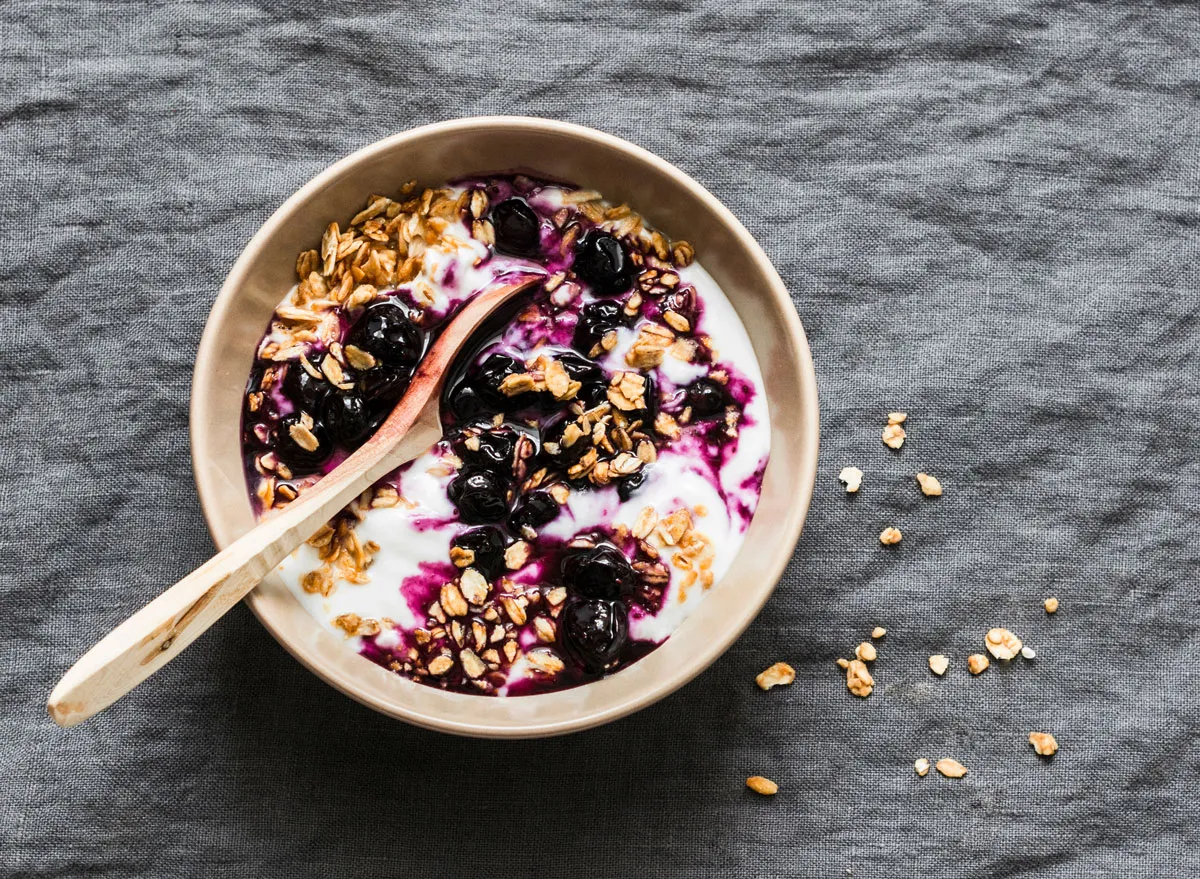What Happens to Your Body When You Eat Yogurt Every Day

The average American consumed about 14.3 pounds of yogurt in 2021. And is that any surprise? This dairy product is remarkably versatile—you can use it as a base for your morning bowl of granola, as a convenient portable snack for work, as a healthy dessert, or even as a base for a homemade salad dressing or marinade. Plus, nowadays, there are more options than ever to choose from, from Greek to Icelandic skyr, full-fat to non-fat, and high-protein to lactose-free. Whichever your go-to yogurt type is, you're likely well aware by now that this food comes with more than a few health benefits.
Rich in nutrients such as protein, calcium, and probiotics, yogurt has long been associated with bone strength, gut health, and weight management. But do you know the other potential benefits and side effects of eating yogurt every day? Because that's only the beginning. "Frequent consumption of yogurt has been shown to improve risk factors for cardiovascular disease, to lower diabetes risk, and to enhance immune function," says Brooke Glazer, RDN. And that's not all!
If you're a yogurt lover or are just trying to incorporate it more consistently into your diet, read on to learn more about the potential benefits and side effects of eating yogurt every day. Then, for tips on which yogurts to buy, check out The 13 Best Yogurt Brands—and 3 To Avoid.
You'll get a protein boost.

Yogurt—especially Greek yogurt or Icelandic skyr—can be great for providing a protein boost with low levels of sugar and fat. For example, in a 5.3-ounce container of Chobani Nonfat Greek Yogurt, you're getting 14 grams of protein.
Because protein can help keep you full by reducing hunger hormones and minimizing cravings, a high-protein food like yogurt can be ideal as a morning meal you can top with fruit, granola, or nuts, or a mid-afternoon snack that can help keep you full until dinner.
You may experience healthier blood pressure levels.
According to Lisa Young, PhD, RDN, "Research shows that yogurt is good for the heart and can help lower blood pressure."
A 2018 study published in the Journal of Hypertension found that higher consumption of dairy products—especially dairy yogurt—was linked to fewer cases of high blood pressure in adults. Specifically eating more yogurt and more closely following the "Dash Diet" is a combination that was linked to a 30% lower risk of high blood pressure.
Another study found that a higher intake of protein may also be associated with lower blood pressure levels, which is another way in which yogurt may be able to help.
Your 'bad' cholesterol levels may decrease.
Along with the potential to help lower your blood pressure, yogurt can also help your heart by potentially helping to manage blood cholesterol levels, too. One study that was published in the Journal of Dairy Sciences looked into the effects of probiotic yogurt on participants with type 2 diabetes. What they found was that daily consumption of this yogurt was associated with lower LDL and total cholesterol.
You'll increase your calcium intake.

Aside from protein, a helpful nutrient that yogurt can provide your body with is calcium, which is necessary for functions relating to your muscles, nerves, blood vessels, and bones. For instance, your bones contain a large portion of calcium, and when you're not consuming enough calcium through the foods you eat, your body actually begins to pull calcium from your bones. That is one reason dietary calcium is so important.
All milk products, including yogurt, are rich sources of calcium, so eating dairy yogurt (not all plant-based yogurts will have calcium) on a regular basis is an effective way of getting enough calcium in your body.
Your digestive tract will get some extra help.
While the word "bacteria" may automatically trigger negative associations, there are "good" bacteria that are essential to making sure your digestive tract functions properly. One way you can increase levels of those good bacteria is by consuming probiotics: live microorganisms found in certain foods and supplements.
According to Lindsey Kane, MS, RD, LDN the Director of Nutrition at Sun Basket, maintaining a healthy gut microbiome—which is the collection of microorganisms, including bacteria, yeast, and viruses, that live in your large intestine—promotes bowel regularity, reduces bloating and general GI discomfort, and mitigates symptoms associated with Crohn's disease, ulcerative colitis, and IBS.
Unfortunately, not all yogurts are created equal in regard to probiotics. "Most yogurts undergo pasteurization after fermentation, and this pasteurization process destroys the fragile probiotics cultivated during fermentation, causing you to lose out on any of the benefits they once had to offer," says Kane. For this reason, Kane recommends choosing yogurt with a label that indicates it contains live and active cultures.
Ideally, Kane advises selecting one that contains multiple strains of bacteria. "Think of this as diversifying your roster for a sports team," she explains. "You need all sorts of players to build a versatile unit, each contributing different skills and talents to create a strong and resilient squad capable of handling any opponent that comes their way." Other than that, as long as you go for a product that doesn't contain heaps of added sugar, yogurt can definitely be a super healthy component of your daily diet.
Your immune system will get some support.
Speaking of probiotics, Glazer notes that having a healthy gut plays a key role in making sure you can fend off illness by regulating what gets to pass through the lining and enter your bloodstream.
"Kind of like a bouncer that decides who gets to come into a nightclub, our microbiome prevents dangerous bacteria from getting inside our body, thereby aiding immune function," says Glazer. "Since yogurt contains probiotics that create a healthier gut and the gut regulates immune function, eating yogurt can improve immunity."
Kane also points out that probiotics have been shown to prompt the synthesis of natural antibodies and immune cells like lymphocytes and Natural Killer T cells, which can attack invading viruses and toxins.
Your mental health may improve.

Remember those friendly flora mentioned earlier? According to Kane, probiotics don't just positively impact your physical health, but your mental health as well.
An increasing number of studies have demonstrated that the gut-brain connection definitely exists—and Kane notes that some research has found probiotics to improve anxiety, depression, stress, mood, and memory. While you likely won't notice these effects after just one serving of yogurt, if you're eating it on a regular basis, it could definitely make a difference over time.
Your body will send signals of fullness to your brain.
Provided you're opting for a yogurt that's high in protein, there's a good chance that you'll feel satisfied after eating it. This is especially true if the yogurt isn't nonfat.
"Yogurt is a nutritional powerhouse—it is full of protein, fat, and carbohydrates, the triple threat for long-lasting satiety and energy," says Kane. This is why yogurt is such an ideal snack option for keeping those hunger pangs at bay.
You'll get a rush of many vital nutrients.
In addition to probiotics, yogurt is packed with many other nutrients that your body can benefit from. For example, Kane says you'll get a decent dose of phosphorus (for bone health), magnesium (which supports energy metabolism, sleep, and mood), and potassium (which regulates blood pressure, muscle mobility, and recovery). And that's not all.
"Probiotics actually produce vitamin K as well, which is used for healthy blood coagulation (clotting) to support healing," says Kane.
One downside: You may consume a lot of added sugar.

Yogurt can provide your body with a boost of protein and other helpful nutrients, but many store-bought varieties come packed with excess amounts of added sugar. Take Dannon Fruit On The Bottom, for instance. Their peach flavor may be low in fat, but it provides only five grams of protein and a whopping 21 grams of sugar.
If you're trying to limit your consumption of the sweet stuff, try plain yogurt and sweeten it up with fresh fruit or a small drizzle of honey or maple syrup.
"A dash of vanilla or a pinch of cinnamon also works wonders in creating a sense of sweetness without actually adding any sugar at all," Kane suggests.
A previous version of this story was published on September 4, 2020. It has been fact-checked and updated to include additional copy and supplemental research.









